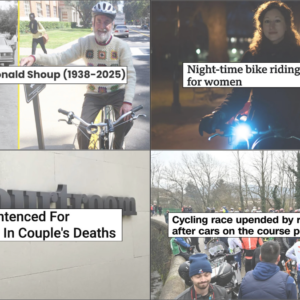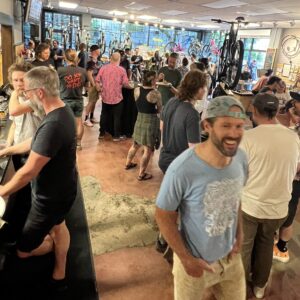In observance of our national holiday to commemorate the birth of Martin Luther King Jr., I thought I’d share a video clip (below) of the man in action (big tip o’ the hat to Matt Davis of the Portland Mercury).
I realize that the effort to make bicycles an accepted and respected form of transportation in America is a far cry from the struggles of the Civil Rights Movement — but there are parallels. Many of us who represent “the bike community” or “bicyclists” have been called upon to explain our tactics and ideas to people who don’t see the world in the same way.
In the video below, a young Martin Luther King, Jr. faces tough questions about his movement’s tactics from the panel of NBC’s Meet the Press. The way he handles these questions is something everyone can learn from.







Thanks for reading.
BikePortland has served this community with independent community journalism since 2005. We rely on subscriptions from readers like you to survive. Your financial support is vital in keeping this valuable resource alive and well.
Please subscribe today to strengthen and expand our work.
John, thanks for sharing that excellent video. It will show a lot of people Dr King’s genius.
Enjoy riding today! Joe
great video. let’s hope the ‘obey the [unjust] laws!’ crowd listens in…
Jonathon, bike advocacy is certainly a far cry from the civil rights movement. Folks riding bikes to work, to the store or for any other purpose face nowhere near the contempt, hostility and violence faced for years by civil rights workers. It would have been sufficient, though unnecessary on this forum, to simply post a link to the video. Bike advocacy is important, but it doesn’t come close to rising to the significance of reforming this country’s civil right’s laws.
I have to second Mark’s opinion on this. Biking, like driving, is a choice and a privilege. The color of one’s skin is not.
They really don’t like this site much “over there” do they?
http://blog.oregonlive.com/commuting/2010/01/did_bike_portland_just_compare.html
At least it’s getting the site attention I guess, though.
New blog post: Remembering Martin Luther King, Jr. http://bikeportland.org/2010/01/18/remembering-mlk/
New blog post: Remembering MLK http://bit.ly/8eoM8o
New blog post: Remembering MLK http://bit.ly/8eoM8o
Of course the gravity of bike issues doesn’t compare with civil rights issues, and Jonathan acknowledges that.
I was fortunate enough to attend the MLK, Jr. Prayer Breakfast at the Convention Center yesterday morning, put on by the Skanner news group here in Portland.
The keynote speaker was Robin Morris Collin, law professor at Willamette University. She spoke on Sustainability – and one tidbit I’d like to share, is that truly sustainable practices involve a triad of Environment, Economics and Social Justice.
How many of us think about the latter? Certainly not enough.
Although I have been somewhat skeptical about this post, I would add that Dr. King began to address the war in Vietnam and economic injustices just prior to his assassination. Therefore, he would have understood issues not specifically related to racism and civil rights as part of the larger fabric of “justice” issues.
I was at The Skanner’s MLK, Jr. breakfast also (like Bill #9), as was Earl Blumenauer and his bike lapel pin, which was about the only evidence you could find at the event that Portland had any interest in cycling at all. I was thinking, listening to the excellent keynote speech on sustainability, how nice it would have been for the BTA or some bike-centric transportation advocates to show support. It would be nice if the cycling community in general showed any kind of interest in social justice issues, but outside of Community Cycling Center (and, increasingly, Bike Farm), there isn’t any. Robin Morris Collin is right, there is no real sustainability without a measure of economic and social justice. The problem with the bike community’s tactics and ideas is that they don’t take these things into account.
Jackattack,
Actually, Bike Portland is one of my favorite sites. Jonathan and Elly do some great work. But this post was puzzling. As has already been pointed out, riding a bike a privilege (in Portland, it’s often a white, middle class privilege). Drawing “parallels” with the civil rights movement is a bit much. At worst, it’s offensive.
Joe
I think MLK’s perseverence in the Civil Rights Movement, gives hope to all of us fighting our own struggles every day. Take from the man’s vision what you wish, to truth is undeniable.
Would it be better to keep MLK’s ideas locked up and isolated in history? The point of having a day of remembrance is to end such isms for all time, no matter where they are found.
I would guess that it wasn’t too hard to kill a black person 40 years ago; can you tell me how much more difficult it is to kill a biker these days?
Could somebody explain to me why riding a bicycle is a privilege?
Mark (#6) and dsaxena (#7) – bias and predjudice are bias and predjudice, regardless of their origin. No one is equating the two issues, and the struggle of one issue (and it’s parallels to the other) does nothing to diminish the struggle or impact of the other issue. Bike issues share a lot with pedestrian issues – the issue isn’t about whether biking is a choice – it’s about whether all of us have an equal right to mobility, regardless of choice of mode. We do, and to say otherwise is classist.
The struggles against sexism, classism, racism, homophobia, ageism, and many other important issues are all just that – important issues. Each struggle can learn from the others, and all of them are rooted in the same issue – the majority persecuting the minority for being different. Sure, some of those differences can be changed, and some cannot. Before you start disparaging others, however – ask yourself this: why is it ok to persecute someone else for their choice but not for their nature? Is it simply because their nature cannot be changed? Religion is a choice, and not by nature – yet some of the greatest struggles were against foes of a particular religion (or no religion). More people were killed for failing to believe in the Catholic church than in all the movements of the 20th century combined.
We do better by supporting each other’s struggles against bigotry, classism and hatred than we do by elevating any one movement above the others.
Respectfully,
-Matt Picio
Fighting bikism one post at a time.
Is it just me or are you all so anxious to get “all worked up” you create your own reality? So many of you have read so much more into this blog than ever was intended. In my view, this post was clearly stated to be in observance of the National Holiday, remembering Martin Luther King Jr. It was a remembrance of the amazing steps he took to raise the level of awareness surrounding racial and social justice issues in this country.
Jonathan said it himself…”it’s a far cry from the struggles of the civil rights movement” so why are you trying to compare issues here? That’s not the intent of the article.
He’s asking you to watch the video to see the way King handles the questions posed regarding his movement; how he goes about explaining his tactics and ideas. Jonathan is making the parallels here and is praising the manner in which he calmly asserts himself with knowledge and self-confidence responding to others who are asking “tough questions” regarding his movement.
He is suggesting that we learn from him as we (people who care about making things better for cyclists) go about explaining tactics and ideas to people who don’t see things in the same way or feel it’s not important to make adjustments to their world because of the needs of a few.
It’s amazing to me what can be “read into” the most well-meaning and straightforward messages.
As a minority cyclist, I do find this article by Maus most disappointing and embarrassing for the cycling community. With all due respect, Maus, it’s pretty clear you do not understand racial issues in this country.
Best Regards.
Thanks everyone for the comments.
I regret that this post struck some of you the wrong way. Like a previous commenter said, my intention was not to draw direct comparisons between race issues and biking.
However, it’s very interesting to me to read some of these reactions. To me, there are indeed similarities between the stereotyping and treatment of people during King’s time with how people that ride bicycles are treated. From where I sit, I hear and read about many instances where people are discriminated against for no other reason than because they are on a bicycle. People say hateful things about “bicyclists,” they group all “bicyclists” together and form stereotypes that are harmful and often can have tragic consequences (road rage). As a movement (although I’m reluctant to have to legal system do not treat people on bicycles with the same respect and understanding as people that drive motor vehicles. Every time “the bike community” makes some noise it comes off as whining or “here they go again, feeling all entitled and wanting special privileges” — when in reality all people are asking for is basic respect for their needs to feel safe and respected while moving through the city on a bike.
these are just some thoughts. That’s what I do here on bikeportland. In addition to news, I sometimes share thoughts because I think others will find them helpful, interesting, or whatever.
thanks again for the feedback. as always I appreciate and I’m open to being told I’m totally off base!